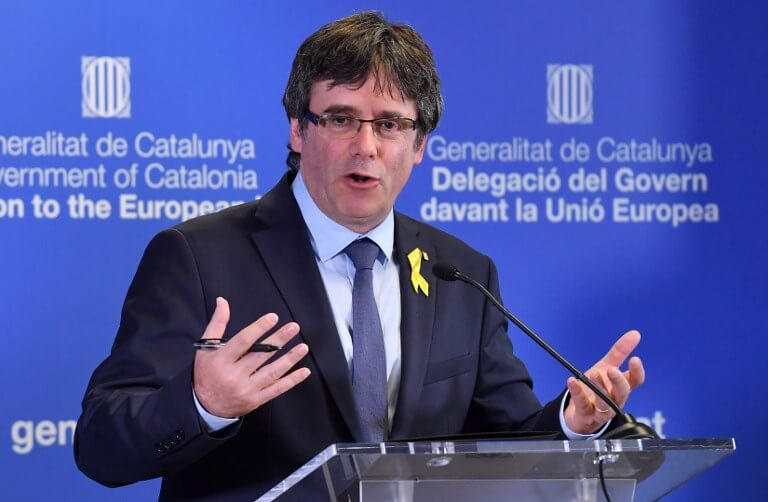The Spanish Supreme Court said on Thursday that it was opening an investigation into fromer Catalan president Carles Puigdemont (main image) on ‘terrorism’ charges over protests linked to the failed October 2017 Catalan independence bid. Former Catalan MP Ruben Wagensberg has also been cited by the court.
In a statement, the court said it had decided ‘to investigate and, where appropriate, prosecute’ Puigdemont ‘for terrorism offences in relation to the Tsunami Democràtic case’.
The court said it had unanimously agreed to open the investigation, acting on a request from Judge Manuel García-Castellón of Spain’s National Court, who had asked the higher court to take on the case he was overseeing.
Public prosecutors at the Supreme Court had concluded last week that there was no cause to investigate Puigdemont for terrorism and they had requested that the case be shelved. However, the Supreme Court judges disagreed and have appointed Judge Susana Polo to officially lead the investigation.
The judges consider it ‘necessary and pertinent’ that Puigdemont and Wagensberg be investigated by the Supreme Court in particular because they both held public office.
The court ruled out taking on the case of the 10 other people under investigation in the National Court as they haven’t held office.
Tsunami Democràtic is a covert Catalan protest group that was behind a string of protests after Spain jailed 13 pro-independence leaders, two years after their failed bid to break away from Spain. The independence bid had sparked the country’s worst political crisis in decades. (See ‘Background to Catalan political conflict’ below).
On the day the sentence was handed down in October 2019, thousands of activists blocked access to Barcelona airport for several hours, prompting the cancellation of over 100 flights. During clashes between police and protesters, 115 people were injured.
In its decision, the court referred to the crime of ‘street terrorism’. The aim, it said, was to ‘undermine law and order, to seriously breach the peace, to cause serious harm to the functioning of an international organisation or to cause a sense of terror within the population or part of it’.
There was ‘evidence pointing to Carles Puigdemont’s participation in the events under investigation’, the ruling added, referring to his involvement in the creation of the group whose aim was ‘to subvert law and order and to seriously destabilise democratic institutions’.
The case of Tsunami Democràtic has featured prominently in discussions around the approval of the amnesty bill, which aims to pardon those involved in the Catalan independence movement. ALSO READ: ‘Junts per Catalunya’ vote against amnesty bill on grounds it doesn’t go far enough.
Background to Catalan political conflict
Nine Catalan politicians and activists were jailed for between 9-13 years by the Spanish Supreme Court in October 2019, convicted of sedition and misuse of public funds for their role in the 2017 illegal referendum, with the verdicts causing widespread protests across Catalonia. In June 2021, the nine walked free from prison, following pardons granted by the government led by socialist Prime Minister Pedro Sánchez, but they remained banned from holding public office.
In late 2022, Spain passed a controversial criminal code reform that downgraded the two charges used against them, abolishing sedition and replacing it with that of aggravated public disorder, and also reducing the penalty for misuse of public funds.
Carles Puigdemont had led the government of Catalonia when it staged the referendum banned by Madrid and the courts, which was followed by a short-lived declaration of independence. He then fled to Brussels to avoid prosecution in Spain, and is currently an MEP.
Spain’s current PSOE-Sumar coalition government has now introduced a controversial amnesty bill to parliament. Called the ‘Organic Amnesty Law for the Institutional, Political and Social Normalisation in Catalonia’, the bill to grant an amnesty to Catalan pro-independence politicians and activists facing legal action over their role in the October 2017 illegal referendum in Catalonia was pledged by Prime Minister Pedro Sánchez in order to secure the support of Catalan parties and remain in power.
Click here for all our reports related to Catalan independence.
ALSO READ: Judges extend probes into Puigdemont’s alleged ‘Kremlin ties’ and ‘Tsunami terrorism’.
ALSO READ: Amnesty bill registered in Spanish Congress – full details.
Sign up for the FREE Weekly Newsletter from Spain in English.
Please support Spain in English with a donation.
Click here to get your business activity or services listed on our DIRECTORY.
Click here for further details on how to ADVERTISE with us.


